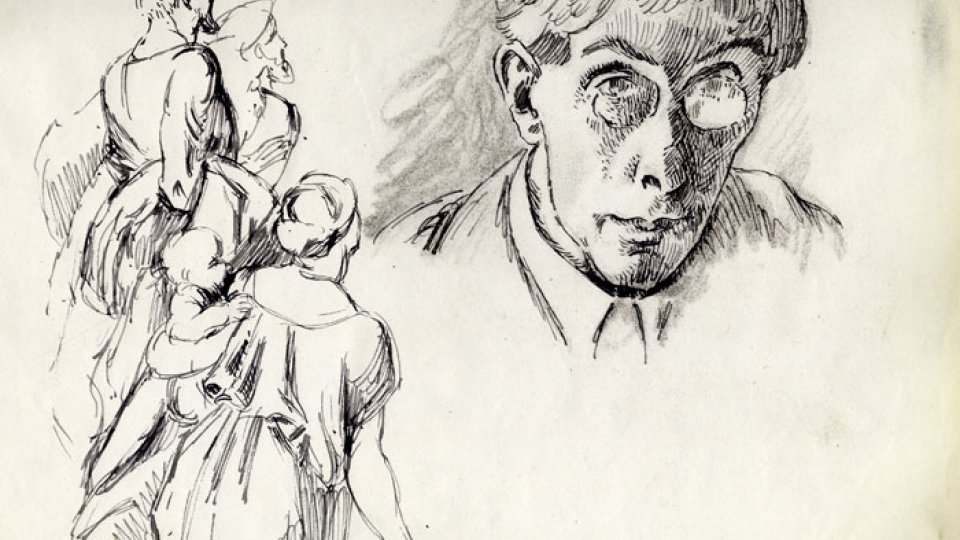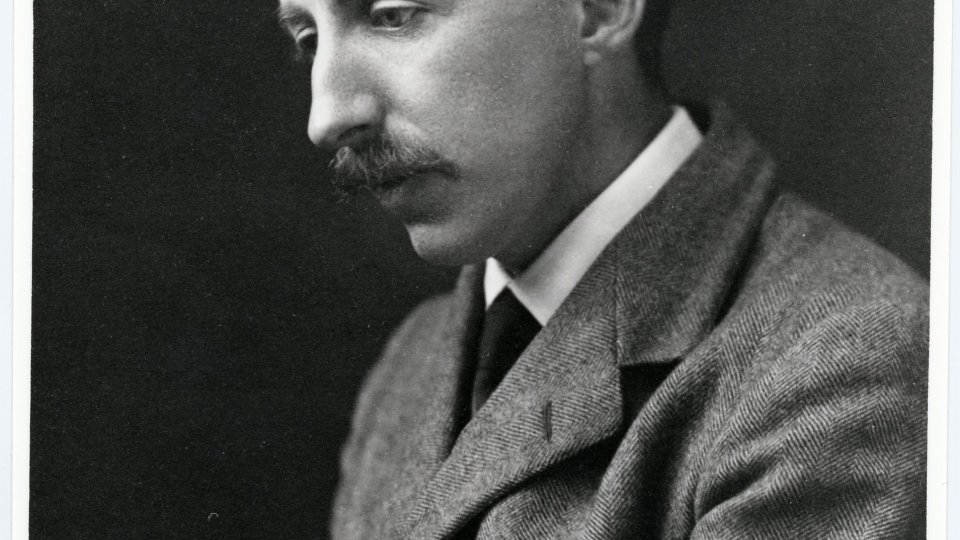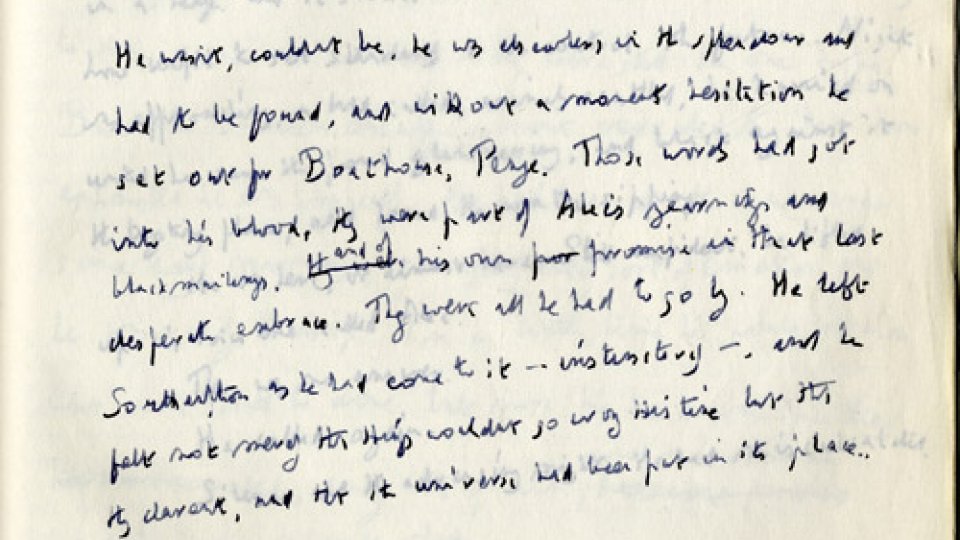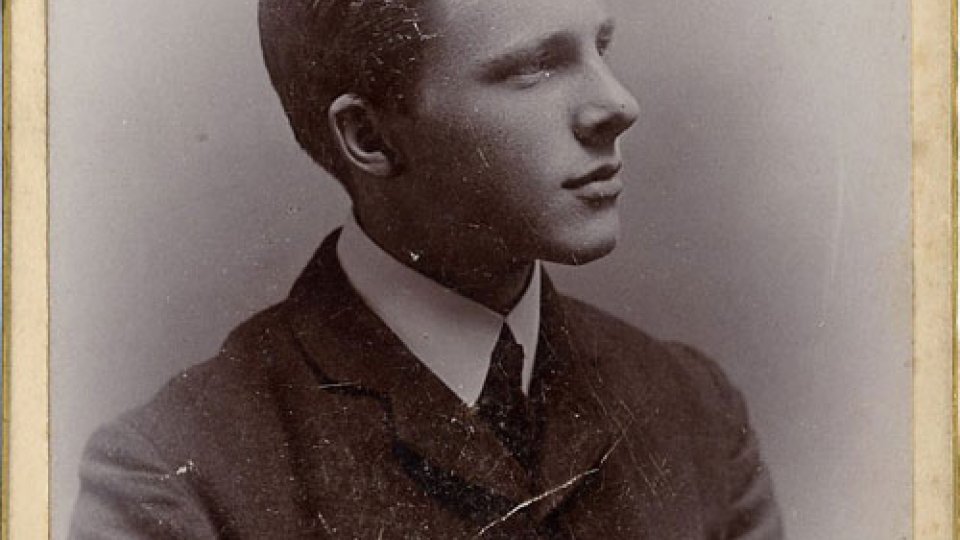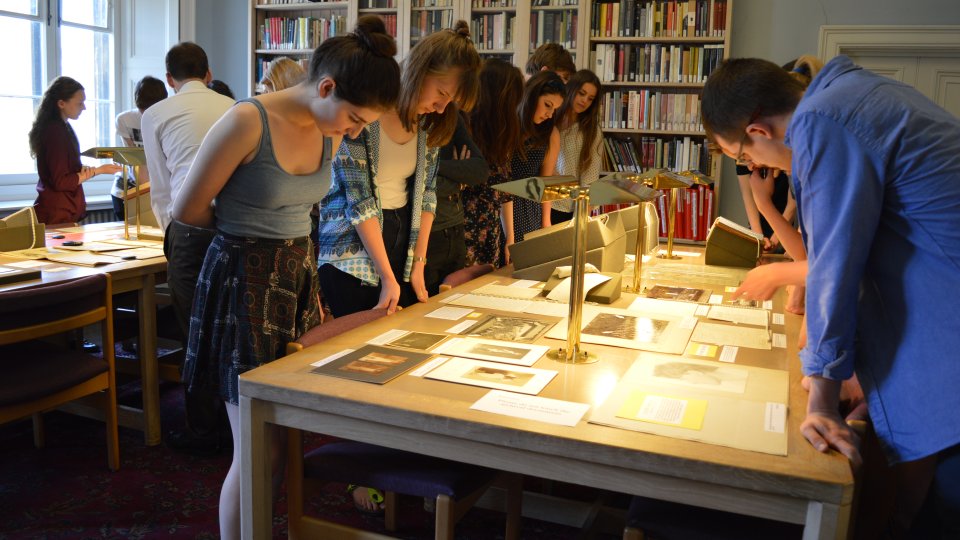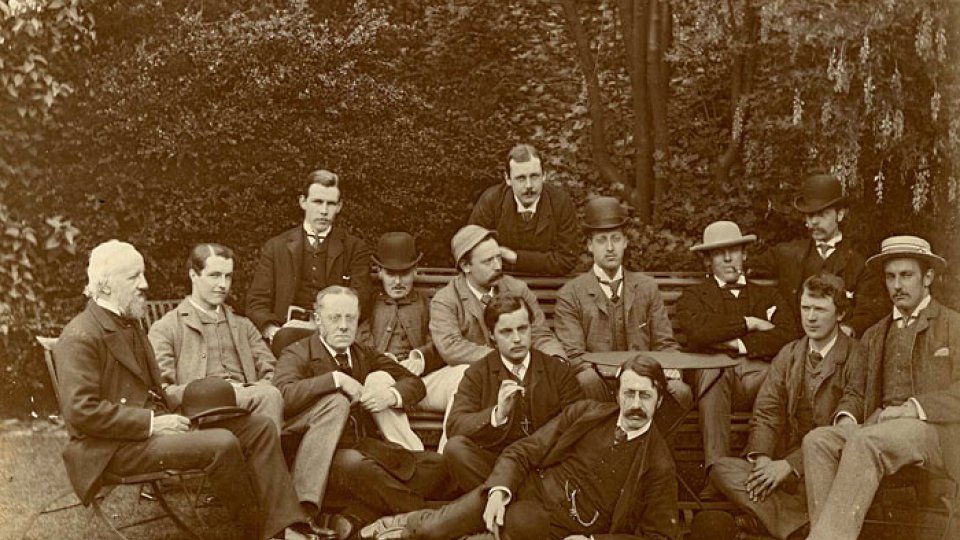![Apostles group photo, c.1883. J.K. Stephen (KC1878) is wearing a hat and smoking a pipe. [KCAS/39/4/1] Apostles group photo, c.1883. J.K. Stephen (KC1878) is wearing a hat and smoking a pipe. [KCAS/39/4/1]](https://www.kings.cam.ac.uk/sites/default/files/styles/large/public/page-images/kcas-39-4-1-group-photo.jpg)
In this exhibition, we shall explore the history of the secret debating society the Apostles, up to 1930.
Several original papers are held in the archives at King's College, so a selection has been uploaded as downloadable pdfs. Please note that all the papers are still in copyright, with the rights usually being held by people other than King's College. Permission has been given to publish them on this website but not to share the pdfs more widely,
The Apostles, also known as The Conversazione Society, or simply ‘The Society’, was founded on 1 April 1820. As the early register pages (shown below) show, its original members were predominantly St John’s College students, who might be considered evangelical Anglicans. Its founding member, George Tomlinson, became Bishop of Gibraltar.
The Apostles are thought to have got their name due to the fact there were 12 members, although it might not be a coincidence that the Society provided a private forum for the critical discussion of such topics as religion and ethics. It was founded at a time when clubs and societies tended to focus on drinking, dining or sport. Though it was not unique in its focus on intellectual debates, the Society endured in a way other similar groups didn’t.
Members, who referred to each other as Brethren, were selected by existing members, with a sponsor suggesting each new ‘embryo’ (candidates for election to membership). Apostles who left the Society and joined the outside world were said to have ‘taken wings’ and become Angels. Current Apostles tended to have weekly meetings in each other’s rooms, at which the ‘moderator’ would read an essay/paper from the ‘hearth rug’, to be followed by a debate and a vote. Minutes would be kept, which included titles and votes but little else, with the titles often seemingly unrelated to the topic discussed. Attendance at the meetings was such an expectation that absence was often noted in the minute book.
In addition to Minute Books, they kept Registers and a Photo Book. These vary in detail over the years but often included election numbers and dates, names, the number of essays read, whether they were made an honorary member (Angel) and whether they held a position such as that of Secretary. In early Register entries, such as those of the original members below, the dates and titles of their papers are given.
Being a secret society, the records it created had to be kept privately, so until their deposit in the King’s College Archive Centre, they were kept in the ‘Ark’. This is an elaborately carved item, which contained a desktop lectern with drawers. In turn, the ark was on wheels and concealed in a rather plain looking wooden box. The Ark is now kept in the Archives Centre’s reading room. Some of the papers which were read to the Society can be found in the archives (they are now stored under standardised environmental conditions with all other College archives or as part of various deposits of personal papers of individual members).
It can be tempting to assume that long established institutions have stood the test of time because of enduring traditions. While it may be true that the form and rigour of their debate remained faithful to its roots, the membership and ideology of the Apostles became broader.
In the early 20th century, the Apostles formed something of a meeting place for people who would go on to form the Bloomsbury group. Virginia Woolf’s father, Lesley Stephen, had been an Apostle and her cousin, James Kenneth Stephen, also became one. Her future husband, Leonard Woolf, was a member, alongside the likes of John Maynard Keynes, Lytton Strachey, Roger Fry and others.
Lytton Strachey coined the term ‘higher sodomy’ for the love of men for men, as often felt among the Brethren, which was mostly platonic, though not always. According to Richard Deacon’s book on the Apostles, it was not until the 1970s that they elected their first female member.
With the influx of writers (Rupert Brooke, the poet, and E.M. Forster, who became a novelist), artists/critics (Roger Fry) and at least one future art collector (John Maynard Keynes), the concept of Beauty began to be discussed.
Members like McTaggart and Goldsworthy Lowes Dickinson encouraged the discussion of metaphysics and philosophers like Bertrand Russell, Alfred North Whitehead and G. E. Moore became influential members on the questions of Truth and Ethics. Russell even nominated Ludwig Wittgenstein for election but he only lasted one term.
These Apostles often discussed the ‘real’ and ‘phenomenal’ worlds, referring respectively to their world of discussion, with its a priori understanding of the Truth, and the outside world of ordinary experiences such as employment.
It was not until 1828 that William Gifford Cookesley (subsequently Master of Eton) became the first member of King’s College to be elected to the Apostles. He was their 65th member. Though 19th century Apostles had been predominantly Johnians, the dominant colleges in the 20th century might be considered to have been Trinity and King’s College.
The table below provides details of the King’s College members who were Apostles, up to 1930. The Apostles election number is sometimes inconsistent, varying by 1 between the register and the photo book, so I use the register numbers. Where the dates they became honorary members or the number of essays read is known, that is included in the notes column. If they are known to have held the position of Secretary, that is also noted. For those who appear in bold, a section is included below which provides anecdotes, pictures and/or additional information about their membership.
Some of the themes discussed above, along with the questionable notion of ‘secrecy’, are explored further in the sections below.
| Number | Name | KC | Date elected | Notes |
|---|---|---|---|---|
| 65 | Cookesley, William Gifford | 1821 | 8 November 1828 | Lapsed 16 May 1829. |
| 112 | Johnson [Cory], William | 1842 | 10 March 1844 | Hon. 1 November 1845. 3 essays. |
| 141 | Browning, Oscar | 1855 | 11 December 1858 | Hon. 29 October 1845. 5 essays. |
| 148 | Cornish, Francis Warre | 1857 | 1860(?) | |
| 168 | Blakesley, George Holmes | 1864 | 22 February 1868 | 2 essays. |
| 185 | Welldon, James Edward Cowell | 1873 | 6 February 1875 | Hon. 12 October 1879. 6 essays. |
| 190 | Macauley, William Herrick | 1874 | 20 May 1876 | Hon. 10 May 1884. 4 essays. |
| 197 | Stephen, James Kenneth | 1878 | 17 May 1879 | Hon. 3 June 1882. 20 essays. 40th Secretary. |
| 204 | Raleigh, Walter Alexander [Sir] | 1881 | 28 October 1882 | 12 essays. |
| 209 | Dickinson, Goldsworthy Lowes | 1881 | 14 February 1885 | Hon. 16 June 1888. 28 essays. |
| 214 | Fry, Roger Eliot | 1885 | 28 May 1887 | Hon. 20 November 1891. 44th Secretary. |
| 215 | Wedd, Nathaniel | 1883 | 25 February 1888 | Hon. 6 February 1892. 46th Secretary. |
| 217 | Mayor, Robert John Grote | 1888 | 2 March 1888 | Hon. 10 November 1894. 47th Secretary. |
| 225 | Green, Walford Davis | 1888 | 1892 | |
| 234 | Ainsworth, Alfred Richard | 1898 | 4 November 1899 | Hon. 4 November 1911. 51st Secretary. |
| 236 | Meredith, Hugh Owen | 1897 | 26 May 1900 | |
| 237 | Forster, Edward Morgan | 1897 | 9 February 1901 | Hon. 14 October 1905. |
| 238 | Sheppard, John Tresidder | 1900 | 8 February 1902 | Hon. 6 June 1908. 53rd Secretary. |
| 243 | Keynes, John Maynard | 1902 | 28 February 1903 | Hon. 12 November 1910. |
| 247 | Brooke, Rupert Chawner | 1906 | 25 January 1908 | 12 essays. 57th Secretary. |
| 248 | Shove, Gerald Frank | 1907 | 30 January 1909 | |
| 251 | Békássy, Ferenc István Dénese Gyula | 1911 | 27 January 1911 | |
| 253 | Bliss, Francis Kinnard | 1911 | 16 November 1912 | |
| 255 | Marshall, Maurice Oswald | 1913 | 7 November 1913 | |
| 259 | Penrose, Alexander Peckover Doyle | 1919 | 29 November 1919 | Hon. 15 May 1926. |
| 263 | Braithwaite, Richard Bevan | 1919 | 26 February 1921 | Hon. 25 December 1925. |
| 264 | Ramsey, Frank Plumpton | 1924 | 22 October 1921 | Hon. 21 November 1925. |
| 265 | Rylands, George Humphrey Wolferstan | 1921 | 25 February 1922 | Hon. 19 May 1928. |
| 266 | Thomson, George Derwent | 1922 | 10 November 1923 | Hon. 8 June 1929. |
| 267 | Hamer, F.E. | 24 January 1925 | Hon. 4 November 1911. | |
| 268 | Watkins, Arthur Ronald Dare | 24 October 1925 | Hon. 8 March 1930. | |
| 269 | Lucas, Donald William | 7 November 1925 | Hon. 8 November 1930. | |
| 271 | Watson, A.G.D. | 29 January 1927 | ||
| 272 | Proctor, Philip Dennis | 22 October 1927 | Hon. 8 March 1930. | |
| 273 | Bell, Julian Heward | 17 November 1928 | ||
| 275 | Cruso, Francis Julian Alford | 8 June 1929 | ||
| 276 | Lintott, Henry Bevin [Sir] | 30 November 1929 |
As a King’s Scholar, Oscar Browning came up to King's College from Eton in 1856. A prizeman, he thrived in the classical tripos and graduated in 1860. He became a fellow of King's in 1859. From 1860 until 1875, he was an assistant master at Eton. After his dismissal in 1875, he returned to King's and the Fellowship there to which he had been elected in 1859. He lived as a Fellow in King's for more than thirty years, tutoring, lecturing and writing, and gaining great popularity among undergraduates (to whom he was known as 'the OB') for his generosity and eccentricities. In 1909 he retired to a rented house at Bexhill-on-Sea. He was visiting Italy when war broke out in 1914, remained there, and eventually decided to settle permanently. He died in Rome in 1923 at the age of eighty-six.
OB was an influential member of the Apostles, despite only being the third Kingsman to be elected. He read 5 essays and the Ark was constructed at his instigation.
Goldsworthy Lowes Dickinson’s feelings about the Apostles are best put in his own words, taken from his autobiography:
At the end of 1884 after my return to Cambridge I was elected to the Society of the Apostles, .... It formed for many years a very important part of my life, though not so much at my first election, as in the year or two following, when McTaggart, the philosopher, Roger Fry, and Wedd (afterwards Classical teacher at King’s) were the active members. We met, as still the Society meets, on Saturday nights. A paper was read and we spoke in turn, drawing lots for the order. These were, and are, the externals. The soul of the thing, as I felt it, is incommunicable. When young men are growing in mind and soul, when speculation is a passion, when discussion is made profound by love, there happens something incredible to any but those who breathe the magic air. Some breath of it, I almost think, still hangs about the dedication to Cambridge printed in my little volume of verse. I go still to the Society, from time to time, find it of course different from what it was in my youth, in the topics and the opinions discussed, but find also the same spirit of free, candid uncompromising youth, of all spirits, to my mind, the most beautiful and touching. Oh, brethren, if ever any of you should read these words, be sure that they are written by one who has never forgotten and never been faithless.
Later in his autobiography, ‘Goldie’ (as his friends knew him), describes falling in love with fellow-Apostle Roger Fry.
Roger Eliot Fry came up to King’s College in 1885. He gained a first in the Natural Sciences tripos , completing his B.A. in 1888 He was elected to the Apostles in 1887. Fry is best known as the artist and art critic, who introduced Post-Impressionism to Britain through his ground-breaking exhibitions at the Grafton Galleries in 1910 and 1912. He became an Honorary Fellow of King’s College in 1927.
Despite the secrecy surrounding the Apostles, Fry wrote to his mother about his election and to his non-Apostle friend C.R. Ashbee about his friendship with fellow-Apostle Goldsworthy Lowes Dickinson.
It is worth momentarily returning to Dickinson’s autobiography, to see how highly he thought of Wedd.
He was two years junior to me, so that we had been undergraduates together. In those days, he had been notorious for blasphemy (so called) and the reading of Baudelaire. He was elected to the Apostles and with Fry and McTaggart was a principal attendant from 1886 on. He is, I think, one of the ablest men I have known. He became a Fellow and Classical tutor at King’s and his teaching was universally admired by his pupils.
One such pupil was his brother Apostle, E.M. Forster. The impact he had on Forster is explored in a separate exhibition on the author (see the link at the bottom of the section on Forster, below).
To find out about E.M. Forster and his experiences as an Apostle, please visit the online exhibition on him (see link at the bottom of this page). There you will find details about his nomination and a paper he read, entitled ‘The Feminine Note in Literature’.
Forster was elected an Apostle on 9 February 1901. His experiences as a member were to influence his writings. Most famously, the opening scene of his novel The Longest Journey is inspired by Apostles meetings. A letter below shows that he was also inspired by a paper read by Rupert Brooke on 24 November 1911.
John Tresidder Sheppard was born on 7 November 1881. He attended Dulwich College, then won a scholarship to King’s, matriculating in 1900.
After a short time teaching Classics at Emmanuel College, he was elected to a Fellowship at King’s in 1906 and was a lecturer in Classics from 1908 to 1933. He translated Greek plays, and was involved as an actor and as producer of a number of plays in Cambridge. During the First World War he did intelligence work which earned him an MBE. Sheppard returned to Cambridge after the war, and was elected Vice-Provost in 1929. From 1933 to 1954 he was Provost of the College. He was knighted in 1950 for services to Greek. He died on 7 May 1968.
Sheppard was elected to the Apostles on 8 February 1902 (the same day as Lytton Strachey). He served as their 53rd Secretary.
In P.N. Furbank’s biography of E.M. Forster, he describes tensions that were forming within the Apostles in 1903 regarding the differences in attitudes between its King’s and Trinity College members. Possibly in response to discussions about this with Forster, Sheppard read a paper entitled ‘King’s or Trinity’. While cautious about over-generalisation, Sheppard summarised these differences thus (as quoted by Furbank):
At first sight, then, Trinity appears to King’s to be stern, arrogant, intolerant, generally rather unamiable, sometimes well nigh intolerable… She seems to think that there are two classes separated by a clear line of distinction, the clever and the not clever… whereas really there are as many classes as there are human beings, and we ought never perhaps to use the word ‘clever’ at all except when we say ‘more clever’ or ‘less clever’. (I speak as a Kingsman.) King’s has an unconquerable faith in the value and interest of human beings… We care for what we call ‘character’. I think we care for it more than intellect
If Sheppard wished to unite the members from Trinity and King’s, the votes in the minute book suggest he was unsuccessful.
John Maynard Keynes was born in Cambridge on 5 June 1883. He was educated at Eton, and came up to King's College, Cambridge as a scholar in 1902.
After graduating he entered the Home Civil Service and served for two years at the India Office. He left the civil service in 1908, however, and in 1909 was elected a Fellow of King's College and remained so until his death. He was lecturer in Economics from 1911 to 1937 and in 1919 he also accepted the post of Second Bursar of the College. Keynes spent much of his time in London, including working for the Treasury. In 1924 he began his memorable tenure as First Bursar, changing completely the philosophy by which the college managed its assets, and in 1925, he married Lydia Lopokova.
One of Britain’s most noted economists, he wrote Economic Consequences of the Peace (1919), Treatise on money (1930) and his later General theory of employment, interest and money (1936).
He was elected an Apostle on 28 February 1903. His interests were incredibly diverse, including collecting books on the history of science and several Newton manuscripts; and collecting modern art. He was also a theatre patron. The diversity of his interests was perhaps reflected in his numerous papers to the Apostles.
He died on Easter Sunday, 21 April 1946, after several years of ill-health.
Rupert Chawner Brooke was born on 3 August 1887, in Rugby, Warwickshire.
In 1906, he came up to King’s College, where he studied in the first part of his tripos, before turning his attention to English. After graduating, he travelled extensively. His dissertation ‘John Webster and the Elizabethan drama’ gained him his Fellowship at King’s College, in 1913. He wrote such famous poems as ‘The Old Vicarage, Grantchester’ and the ‘Soldier’. While sailing for Gallipoli, he suffered from sunstroke and blood poisoning. He died aboard a French hospital ship on the following 23 April 1915 and was buried on the Greek island of Skyros.
Certain Apostles became Rupert Brooke’s closest friends in later life, not least Edward Marsh. He often referred to the Apostles in letters to Marsh and sometimes to Ka Cox.
Brooke read numerous papers to the Apostles. The titles provided on his papers and in the corresponding minutes seldom matched. While it was normal for Apostles papers to be given obscure titles, with little relevance to the topic discussed, Brooke’s titles were perhaps the most obscure.
Frank Plumpton Ramsey was born in Cambridge on 22 February 1903. After going to school at Winchester College, he returned to Cambridge to study mathematics at Trinity College, where he became a wrangler. He was elected an Apostle on 22 October 1921. Admitted to King’s College as a Fellow on 17 October 1924, he was a College and University lecturer. Despite having studied mathematics, he is best known for his work in philosophy, not least translating Wittgenstein’s Tractatus logico-philosophicus. Ramsey died on 19 January 1930. Several of his academic papers have been published and he has recently been the subject of a popular biography; those who are aware of his work tend to find him deserving of far greater attention than he has generally received.
Deacon, R., (1985). The Cambridge Apostles : a history of Cambridge University's élite intellectual secret society, London: Royce.
Dickinson, G.L., Proctor, D. & Annan, N.G.A., (1973). The autobiography of G. Lowes Dickinson and other unpublished writings / edited by Dennis Proctor; with a foreword by Noel Annan, London: Duckworth.
Furbank, P.N., (1979). E.M. Forster: a life, Oxford: Oxford University Press.
Levy, P., (1981). Moore : G.E. Moore and the Cambridge Apostles, Oxford: Oxford University Press.
Lubenow, W.C., (1998). The Cambridge Apostles, 1820-1914: liberalism, imagination, and friendship in British intellectual and professional life, Cambridge: Cambridge Unversity Press.
Mellor, D. (2005, September 22). Ramsey, Frank Plumpton (1903–1930), mathematician and philosopher. Oxford Dictionary of National Biography. Retrieved 2 Jul. 2020, from https://www.oxforddnb.com/view/10.1093/ref:odnb/9780198614128.001.0001/odnb-9780198614128-e-37882.
Fry, R. & Sutton, D., (1972). Letters of Roger Fry / edited with an introduction by Denys Sutton., London: Chatto and Windus.
Spalding, F., (1980). Roger Fry, art and life, London: Granada Pub.
Withers, J.J. & King's College (1929). A register of admissions to King's College, Cambridge, 1797-1925, 2nd ed., London: Murray.
